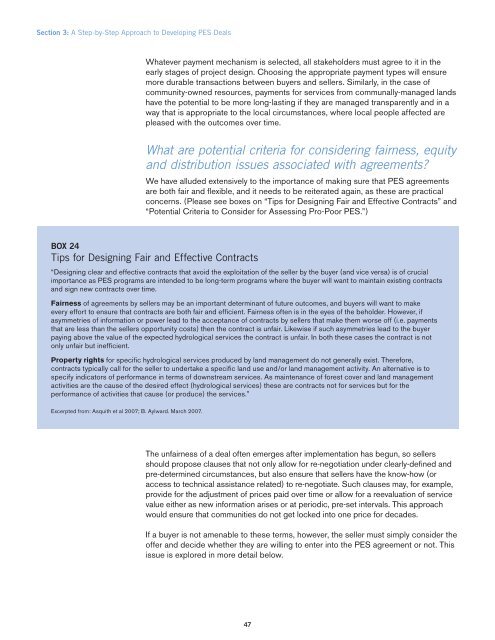Payments for Ecosystem Services: Getting Started. A Primer - UNEP
Payments for Ecosystem Services: Getting Started. A Primer - UNEP
Payments for Ecosystem Services: Getting Started. A Primer - UNEP
You also want an ePaper? Increase the reach of your titles
YUMPU automatically turns print PDFs into web optimized ePapers that Google loves.
Section 3: A Step-by-Step Approach to Developing PES Deals<br />
Whatever payment mechanism is selected, all stakeholders must agree to it in the<br />
early stages of project design. Choosing the appropriate payment types will ensure<br />
more durable transactions between buyers and sellers. Similarly, in the case of<br />
community-owned resources, payments <strong>for</strong> services from communally-managed lands<br />
have the potential to be more long-lasting if they are managed transparently and in a<br />
way that is appropriate to the local circumstances, where local people affected are<br />
pleased with the outcomes over time.<br />
What are potential criteria <strong>for</strong> considering fairness, equity<br />
and distribution issues associated with agreements?<br />
We have alluded extensively to the importance of making sure that PES agreements<br />
are both fair and fl exible, and it needs to be reiterated again, as these are practical<br />
concerns. (Please see boxes on “Tips <strong>for</strong> Designing Fair and Effective Contracts” and<br />
“Potential Criteria to Consider <strong>for</strong> Assessing Pro-Poor PES.”)<br />
BOX 24<br />
Tips <strong>for</strong> Designing Fair and Effective Contracts<br />
“Designing clear and effective contracts that avoid the exploitation of the seller by the buyer (and vice versa) is of crucial<br />
importance as PES programs are intended to be long-term programs where the buyer will want to maintain existing contracts<br />
and sign new contracts over time.<br />
Fairness of agreements by sellers may be an important determinant of future outcomes, and buyers will want to make<br />
every ef<strong>for</strong>t to ensure that contracts are both fair and effi cient. Fairness often is in the eyes of the beholder. However, if<br />
asymmetries of in<strong>for</strong>mation or power lead to the acceptance of contracts by sellers that make them worse off (i.e. payments<br />
that are less than the sellers opportunity costs) then the contract is unfair. Likewise if such asymmetries lead to the buyer<br />
paying above the value of the expected hydrological services the contract is unfair. In both these cases the contract is not<br />
only unfair but ineffi cient.<br />
Property rights <strong>for</strong> specifi c hydrological services produced by land management do not generally exist. There<strong>for</strong>e,<br />
contracts typically call <strong>for</strong> the seller to undertake a specifi c land use and/or land management activity. An alternative is to<br />
specify indicators of per<strong>for</strong>mance in terms of downstream services. As maintenance of <strong>for</strong>est cover and land management<br />
activities are the cause of the desired effect (hydrological services) these are contracts not <strong>for</strong> services but <strong>for</strong> the<br />
per<strong>for</strong>mance of activities that cause (or produce) the services.”<br />
Excerpted from: Asquith et al 2007; B. Aylward. March 2007.<br />
The unfairness of a deal often emerges after implementation has begun, so sellers<br />
should propose clauses that not only allow <strong>for</strong> re-negotiation under clearly-defi ned and<br />
pre-determined circumstances, but also ensure that sellers have the know-how (or<br />
access to technical assistance related) to re-negotiate. Such clauses may, <strong>for</strong> example,<br />
provide <strong>for</strong> the adjustment of prices paid over time or allow <strong>for</strong> a reevaluation of service<br />
value either as new in<strong>for</strong>mation arises or at periodic, pre-set intervals. This approach<br />
would ensure that communities do not get locked into one price <strong>for</strong> decades.<br />
If a buyer is not amenable to these terms, however, the seller must simply consider the<br />
offer and decide whether they are willing to enter into the PES agreement or not. This<br />
issue is explored in more detail below.<br />
47
















